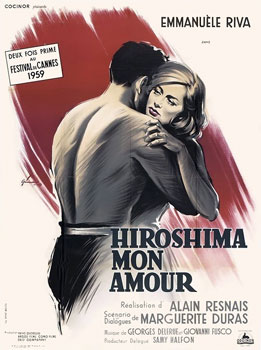| Hiroshima mon amour (Photo credit: Wikipedia) |
* I continue to think about it, and everyday I think about it in a different way.
* The characters are particular; that is, I think of them as specific individuals, not as types from whom we should immediately generalize about how people should behave. That is not to say I do not judge their behavior and take a lesson from it. But my first reaction is as if they were real, which means they have their own reasons that I can never know, no more than if they were real people glimpsed and overheard. This is intriguing. I have to engage with them before I engage with myself. But you can only do that for so long. Sooner or later the movie is no longer a window but a mirror. (Nice, Robertson. Pretty nice.)
* As a man, I identify with the husband. I find myself asking: At which point does he go too far? At which point should he have ceased sacrificing? And I am not thinking of the suffocation. Having gone that far, he may be doing the correct thing. But I am thinking he should have stopped before that moment.
* Except when I don't think he should have stopped long before that moment. Who am I to second guess him? He's there, and I'm not.
* Except he isn't there. He's words on a page turned into sounds and images, just a construct. You could make the case the whole point of the thing is to force the audience to second guess.
* Every day I find myself asking: What would I do in a similar situation. (But I understand that my situation would only be similar and not the same situation as on screen. The movie is not a moral text.)
* What would I do? Don't know. Can't know. Might not want to know if I could know. I can't decide if the movie is comforting - I'm not a baby; I know this is coming and I will handle it as best I can - or challenging - I'm not a baby; I know this is coming, and I will handle it as best I can.
*I understand the director's intent is irrelevant. I understand The Intentional Fallacy. Variable kaleidoscopic interpretation is the hallmark of art.
* Right?
* If I were 21 and writing about this movie, I think I'd think, "Well, that will never happen to me. When I'm that age I'll be freshened up and turned out with the latest assortment of fine pig organs. Very worst case my grandchildren will be carrying my brain around in a glass jar like a fashionable Vuitton purse."
* One thing I do think every day:
Amour or Amour?


I appreciated you opening up to how Amour has made you feel and the way it has made you reflect on you own life. I feel like this movie affects everyone differently - mostly because of the age of the characters and other things like that. Although I was pretty sad and depressed after watching the film, I have not thought about it that much anymore. I feel like that has to do with my age - for example as you are a lot older, this situation is not so far fetched (not saying you will soon have to suffocate your wife which I know you will not have to!).
ReplyDeleteI think the movie is good because it causes people to think about it and reflect on their life through it. That shows just how powerful the movie was despite whether we liked it or not.
scarlette